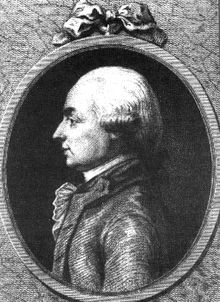Sunday, January 22, 2017
"What is an American?"
In this era of Donald Trump and the changes that will follow my American friends may find it interesting to read the letters of J. Hector St. John de Crèvecœur and particularly his Letter III published in 1782:
"What is an American?"
Jean de Crèvecœur, naturalized in New York as John Hector St. John, was a French-American writer. He was born in Caen, Normandy, France, to the Comte and Comtesse de Crèvecœur. Wikipedia
The University of Virginia have the full text of Letter III (& all his letters)
The New Republic published a commentary in 2013
Herewith a small extract;-
"Formerly they were not numbered in any civil lists of their country, except in those of the poor; here they rank as citizens. By what invisible power has this surprising metamorphosis been performed? By that of the laws and that of their industry. The laws, the indulgent laws, protect them as they arrive, stamping on them the symbol of adoption; they receive ample rewards for their labours; these accumulated rewards procure them lands; those lands confer on them the title of freemen, and to that title every benefit is affixed which men can possibly require. This is the great operation daily performed by our laws.
From whence proceed these laws? From our government. Whence the government? It is derived from the original genius and strong desire of the people ratified and confirmed by the crown. This is the great chain which links us all, this is the picture which every province exhibits, Nova Scotia excepted. There the crown has done all; either there were no people who had genius, or it was not much attended to: the consequence is, that the province is very thinly inhabited indeed; the power of the crown in conjunction with the musketos has prevented men from settling there. Yet some parts of it flourished once, and it contained a mild harmless set of people. But for the fault of a few leaders, the whole were banished. The greatest political error the crown ever committed in America, was to cut off men from a country which wanted nothing but men!
What attachment can a poor European emigrant have for a country where he had nothing? The knowledge of the language, the love of a few kindred as poor as himself, were the only cords that tied him: his country is now that which gives him land, bread, protection, and consequence: Ubi panis ibi patria, (Where there is bread, there is (my) country" (or home, or homeland)) is the motto of all emigrants. What then is the American, this new man? He is either an European, or the descendant of an European, hence that strange mixture of blood, which you will find in no other country. I could point out to you a family whose grandfather was an Englishman, whose wife was Dutch, whose son married a French woman, and whose present four sons have now four wives of different nations. He is an American, who leaving behind him all his ancient prejudices and manners, receives new ones from the new mode of life he has embraced, the new government he obeys, and the new rank he holds.
He becomes an American by being received in the broad lap of our great Alma Mater. Here individuals of all nations are melted into a new race of men, whose labours and posterity will one day cause great changes in the world. Americans are the western pilgrims, who are carrying along with them that great mass of arts, sciences, vigour, and industry which began long since in the east; they will finish the great circle. The Americans were once scattered all over Europe; here they are incorporated into one of the finest systems of population which has ever appeared, and which will hereafter become distinct by the power of the different climates they inhabit. The American ought therefore to love this country much better than that wherein either he or his forefathers were born.
Here the rewards of his industry follow with equal steps the progress of his labour; his labour is founded on the basis of nature, self-interest; can it want a stronger allurement? Wives and children, who before in vain demanded of him a morsel of bread, now, fat and frolicsome, gladly help their father to clear those fields whence exuberant crops are to arise to feed and to clothe them all; without any part being claimed, either by a despotic prince, a rich abbot, or a mighty lord. "
Subscribe to:
Posts (Atom)
